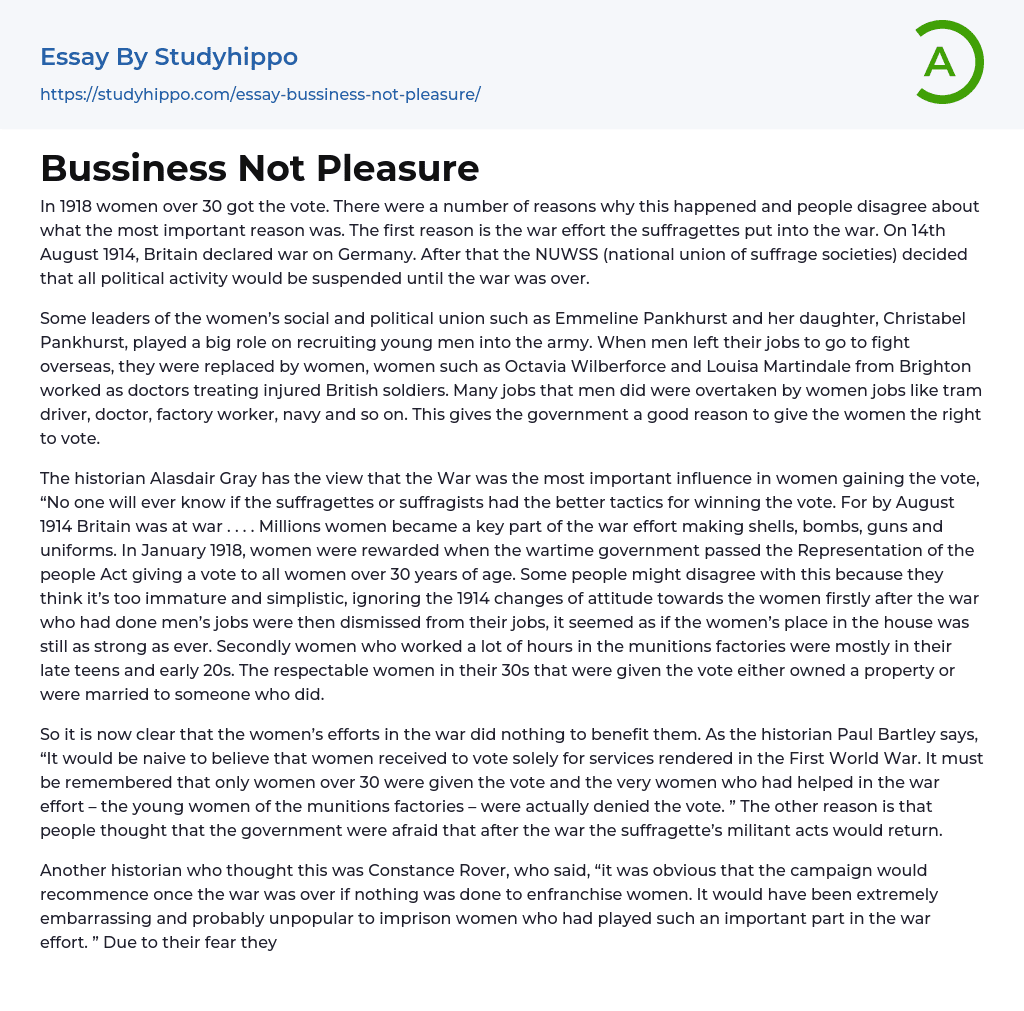In 1918 women over 30 got the vote. There were a number of reasons why this happened and people disagree about what the most important reason was. The first reason is the war effort the suffragettes put into the war. On 14th August 1914, Britain declared war on Germany. After that the NUWSS (national union of suffrage societies) decided that all political activity would be suspended until the war was over.
Some leaders of the women’s social and political union such as Emmeline Pankhurst and her daughter, Christabel Pankhurst, played a big role on recruiting young men into the army. When men left their jobs to go to fight overseas, they were replaced by women, women such as Octavia Wilberforce and Louisa Martindale from Brighton worked as doctors treat
...ing injured British soldiers. Many jobs that men did were overtaken by women jobs like tram driver, doctor, factory worker, navy and so on. This gives the government a good reason to give the women the right to vote.
The historian Alasdair Gray has the view that the War was the most important influence in women gaining the vote, “No one will ever know if the suffragettes or suffragists had the better tactics for winning the vote. For by August 1914 Britain was at war . . . . Millions women became a key part of the war effort making shells, bombs, guns and uniforms. In January 1918, women were rewarded when the wartime government passed the Representation of the people Act giving a vote to all women over 30 years of age. Some people might disagree with this because they think it’s
too immature and simplistic, ignoring the 1914 changes of attitude towards the women firstly after the war who had done men’s jobs were then dismissed from their jobs, it seemed as if the women’s place in the house was still as strong as ever. Secondly women who worked a lot of hours in the munitions factories were mostly in their late teens and early 20s. The respectable women in their 30s that were given the vote either owned a property or were married to someone who did.
So it is now clear that the women’s efforts in the war did nothing to benefit them. As the historian Paul Bartley says, “It would be naive to believe that women received to vote solely for services rendered in the First World War. It must be remembered that only women over 30 were given the vote and the very women who had helped in the war effort – the young women of the munitions factories – were actually denied the vote. ” The other reason is that people thought that the government were afraid that after the war the suffragette’s militant acts would return.
Another historian who thought this was Constance Rover, who said, “it was obvious that the campaign would recommence once the war was over if nothing was done to enfranchise women. It would have been extremely embarrassing and probably unpopular to imprison women who had played such an important part in the war effort. ” Due to their fear they decided they would give the women the vote in order to insure that they had not completely given in they passed the bill
that only women over 30 could vote.
My conclusion is that the government was afraid that after the war the suffragettes would return to their militant acts. In order to stop this from happening the government decided that women could vote but only those over 30 that owned property or married someone who did. Constants Rover’s account also helped me in deciding my conclusion she says, “It would be embarrassing and probably unpopular to imprison women who played such an important part in the war effort. ” And with that I end conclusion.
- Business Law essays
- Contract essays
- Consumer Protection essays
- Property essays
- Ownership essays
- Agreement essays
- Common Law essays
- Contract Law essays
- Justice essays
- Security essays
- Tort Law essays
- United States Constitution essays
- Crime essays
- Lawsuit essays
- Treaty essays
- Family Law essays
- Marijuana Legalization essays
- Constitution essays
- War on Drugs essays
- Court essays
- Jury essays
- Police essays
- Protection essays
- Community Policing essays
- Criminal Law essays
- Judge essays
- Lawyer essays
- Employment Law essays
- Copyright Infringement essays
- Injustice essays
- Intellectual Property essays
- Breach Of Contract essays
- Jurisprudence essays
- Social Injustice essays
- Juvenile Justice essays
- Internet Privacy essays
- Cyber Security essays
- Bill Of Rights essays
- Civil Liberties essays
- First Amendment To The United States Constitution essays
- Fourth Amendment To The United States Constitution essays
- Second amendment essays
- Animal Cruelty essays
- Law Enforcement essays
- Juvenile Justice System essays
- Surveillance essays
- Forensic Science essays
- Crime Prevention essays
- Criminal Justice essays
- Criminology essays




